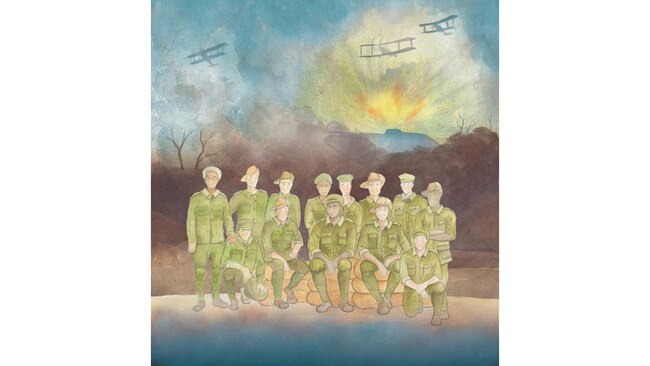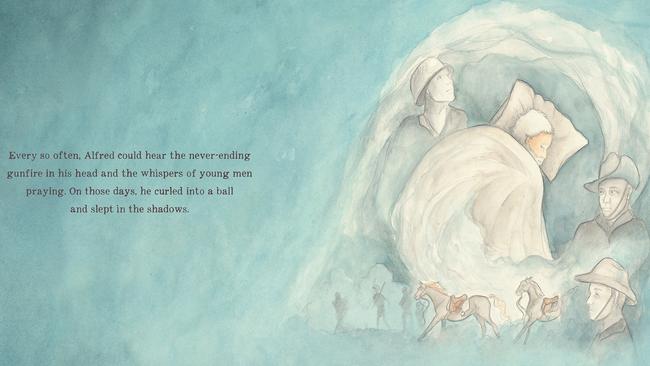Indigenous Anzac book: Alfred’s War, by Rachel bin Salleh
The largely forgotten stories of indigenous soldiers who were equals on the battlefield but second-class citizens at home have been unearthed and reclaimed.

The largely forgotten stories of indigenous soldiers who were equals on the battlefield but second-class citizens at home have been unearthed and reclaimed in recent years. Tom Wright’s 2014 play Black Diggers focused on the overlooked contribution of Aboriginal and Torres Strait Islander soldiers who fought in the trenches of World War I, while the first exhibition honouring indigenous people in the military (during war and peace) was displayed at the Australian War Memorial in 2016.
Now, a beautifully illustrated book, Alfred’s War, brings the story of a World War I Aboriginal Digger to primary school-aged children. Author Rachel Bin Salleh says she “wanted to tell this particular story because there was a distinct lack of information available, especially for children. I had been thinking in previous years about the indigenous war effort. Now it’s much more openly discussed and appreciated, but previously it took a lot of advocacy for our indigenous men and women to be recognised.’’
Alfred’s War will be released this month by Broome-based indigenous publisher Magabala Books — where Bin Salleh is publisher — to coincide with Anzac Day. It centres on Alfred George, a fictional Aboriginal character who grows up on a mission and works on a cattle station before enlisting in the army, naively seeking “adventure and travel’’.
Alfred is shipped home from the war with a “gammy leg” and a head throbbing with troubling memories. Denied the acknowledgment and opportunities afforded to returned white servicemen, he ends up as an itinerant worker, sleeping under the stars and on park benches. While Alfred does not talk about his war experiences, he never forgets his army mates who “didn’t make it home’’.

The book — Bin Salleh’s first — is poignant and subtle, its emotional power heightened by its restraint. A mother of four sons, Bin Salleh says it is important that junior readers form their own opinions “about what is just and right in our society, as these young children will go on to craft the world in which we live’’.
There is a delicate, dreamlike-quality to the watercolour illustrations by Samantha Fry, an indigenous artist from Darwin. Alfred’s War is the first book Fry has illustrated and Bin Salleh says she “was allowed to be as free and creative as she could be. She has done a wonderful job.’’
Albert’s solitary state reflects the difficulties many Aboriginal veterans encountered when they returned home — lacking full citizenship, they were often subjected to curfews or denied access to land under soldier settlement schemes. “They were not necessarily recognised as equal citizens, and they would have been forgotten for many, many years,’’ says Bin Salleh.
The book’s afterword notes that “at the beginning of WWI, Aboriginal and Torres Strait Islander people were prohibited from enlisting in the armed forces on the grounds of their race’’. However, in 1917 “half-castes’’ or Aborigines who had “lived with white men’’ were allowed to enlist. “This was only after Australia had suffered huge casualties and a declining rate of enlistment.’’
Bin Salleh grew up in Broome with an Aboriginal-Malaysian father and an Irish mother. She started her publishing career with Magabala, which champions the work of indigenous authors and illustrators, at 19. An uncle had mentioned there was an internship going “and I was like: ‘What’s Magabala?’ Little did I know that my decision to apply for a job here would take me on a completely different journey.’’
While she wouldn’t “be anywhere else if you paid me’’, she admits there are challenges inherent in operating a publishing house from remote Western Australia. “There is always an extra leg to travel, and we’ve had a really big wet season, so we’ve had lots of issues around our communications.’’

Despite this, the publisher has “upped the ante’’ and is planning to publish 15 books this year, significantly more than its usual eight to 10 titles. Two further books dropped off the list, reveals Bin Salleh, “because our creatives have gone AWOL. That’s OK — it’s part and parcel of being a remote publisher’’.
Impostors are another challenge. In the 1990s, she edited My Own Sweet Time, a work of fiction supposedly based on the life of its author, an Aboriginal woman. It won critical acclaim and a literary award, and was included in the NSW school syllabus before it was revealed the author was in fact a white man, a former taxi driver. “He was from Sydney — where else? They have the most creative taxi drivers,’’ quips Bin Salleh. News of the hoax ricocheted around the world. “Because it was such an interesting affair’’, Magabala now asks “dogged’’ questions about its authors’ identities.
Bin Salleh, 45, says that being a parent informed her approach to Alfred’s War. “As a mother, I’m acutely aware of the men and women who serve in wars, and the value of life. As a mother that’s your worst nightmare — not having your children return home. All of these things coalesced into this one particular story.’’
Alfred’s War is published this month by Magabala Books ($19.99).



